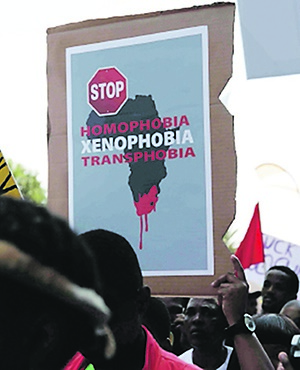
Kelvin Mazungo is a 31-year-old gay man from Kariba in Zimbabwe, Tiwonge Chimbalanga is a 27-year-old transgender woman from Blantyre in Malawi and Jerryl Mondongo is a 30-year-old gay man from Brazzaville in the Democratic Republic of Congo (DRC).
They have more in common than just being young, queer and African.
They have all faced trauma, and have taken refuge in South Africa to escape persecution at home.
And all of them told City Press that as out and proud lesbian, gay, bisexual, transgender and intersex (LGBTI) Africans, you can run but you really can’t hide from your homophobic countrymen, even when far from home.
Why they left
Tiwonge talks about herself in the third person. At first, it’s a bit unsettling – as if she’s an outsider looking in on her own hardship.
“Tiwonge was beaten every single day in prison. They took a big stick and hit Tiwonge in the neck and chest area,” she says of why she fled Malawi for South Africa in 2010.
Her story is famous – google her.
She and her late husband Steven Monjeza were arrested in 2009 for holding a traditional engagement party.
They were released and pardoned after a high-level intervention by the United Nations.
In 2012, Malawi would suspend the laws criminalising homosexuality.
But, in 2015, same-sex marriages and unions would be banned again, with the state refusing to recognise gender reassignment surgery and comparing gay sex with rape.
In her black and white polka dot dress and fake pearls, the scars from Tiwonge’s past are visible on the flesh of her neck and arm.
Later, she shows us the scars on her back, the nails on her fingers a metallic pink.
“When Tiwonge came out of prison, Tiwonge was threatened by people,” she says, pained by the memory. “They said they were going to kill me and my partner. People were always shouting at me and calling me names.”
Homosexuality is illegal in 34 of Africa’s 55 countries and is punishable by death in places such as Nigeria, Sudan and Somalia.
Punitive laws have done little except increase stigma around gender identity, creating social outcasts of LGBTI people.
In the DRC, says Jerryl, “they stone you to death in the street in front of everyone and say you are evil. You can’t do anything in public; you can’t hold hands or kiss your boyfriend because it is dangerous.”
Kelvin says he faced a similar plight in Zimbabwe, where gay men and those suspected of being gay are intimidated by the police or the army.
“The police follow you to see who you are meeting or who you’re driving around with.
When they catch you, they go through your phone to see who you are sending [romantic] messages to. Living there became unbearable. I wanted to be free.”
Kelvin chooses to dress femininely, sometimes in drag. Some Zimbabweans didn’t like that.
“Everywhere I went, they would look at how I dressed and say: ‘Is there any man who dresses like this?’ These were soldiers who’d say this to me,” he tells us.
He arrived in South Africa about four years ago, around the same time as Jerryl, who faced similar problems in the DRC.
“People want to know why you walk or talk like a woman,” says Jerryl.
“When police catch you, they give you an option sometimes to either beat you or arrest you. When they beat you, they beat you until you are close to death ... On the day the police caught me, they beat me so hard that I lost an eye. They took me to my family’s house and beat me some more, right in front of them.
“My family did nothing – they stood there laughing like they didn’t care if I died. I managed to get to the hospital and I knew then that I could not go back home. A friend of mine advised me to get help at the South African embassy and I ran there after I was discharged from hospital.”
Tiwonge, however, says her friends and family were supportive.
“My family would defend me to the government, saying Tiwonge will not change. ‘Tiwonge is Tiwonge,’ they would say.”
But she couldn’t endure life in Malawi any longer.
For immigrants to be allowed asylum in South Africa, they must apply at home affairs for a section 22 permit, which is temporary but recognises the right of the applicant to work and study in South Africa while an application is awaiting a formal decision.
Once approved, applicants are granted asylum status and protection in terms of section 24 of the Refugees Act 1998.
This is granted for four years and can be renewed.
Legal processing of permits begins once an asylum seeker enters South Africa through a border post, airport or harbour, but Kelvin had to pursue alternative means.
“Usually, they want your identity document or a travel document and I didn’t have my documents. I had to pay to have someone smuggle me in,” he says.
Jerryl was easily processed through the South African embassy in Brazzaville.
Tiwonge says that “it was difficult to pinpoint the gender. They wanted to know what Tiwonge is.
Are you a man or are you a woman? They gave me trouble at home affairs. It took about two days.”
They all arrived in South Africa hoping to find greater safety and freedom.
What they found
“I live in Kensington and I walk almost every day to Cape Town to find work,” says Jerryl. “I can’t find a job because employers are worried about the uncertainty of my asylum status.”
With dreams of starting his own hair and nail business stalled, Jerryl relies on piece jobs.
“I look for people in town who want to do their nails. From the little money I get, I mainly buy food.”
“Tiwonge finds it hard to survive,” says Tiwonge, who works as a volunteer for a nonprofit human rights organisation called People Against Suffering, Oppression and Poverty (Passop), which is where we meet her for the interview. “Tiwonge can’t afford end-of-month rent. I tried starting my own business selling vegetables, but need money to grow it.”
Although South Africa’s liberal laws and protections of LGBTI asylum seekers exist, immigrants often experience employment discrimination and xenophobia.
There’s also police abuse and intolerance, according to a Passop report.
Kelvin, who lives in Johannesburg, says South Africa is more tolerant of homosexuality and, although he feels safer here, he still falls victim to xenophobia.
He says some South Africans accuse him of bringing homosexuality to South Africa.
“They’ll say: ‘You ran from your country to come and be gay here.’ And they’ll tell me to go back to where I came from.”
Jerryl says he experienced xenophobia earlier this year.
“I was on a bus ... South Africans were attacking us because they said Somalis were killing their friends and didn’t want any foreigners in their country,” he says. “Luckily, a friend of mine quickly came to pick me up and drove me to the police station, where we were told we’d be kept safe.”
But all the refugees we spoke to agree that their fellow countrymen in South Africa harass them the most.
“The other Zimbabweans don’t leave you alone; they abuse you and sometimes rob you. When we’re in the club, they target you and say threatening things. They do this because they know we are vulnerable,” Kelvin says.
Jerryl says that despite concerns about xenophobia, he has more freedom and feels safer in South Africa.
“People from my very own country have attacked me. They treat me differently and say that I am an abomination,” he says.
Tiwonge says that when she arrived, she “met a lot of people from Malawi who started insulting me and started calling me names again”, that “life was hard even in South Africa”.
She says she has been stabbed and beaten numerous times in South Africa and that she has also been robbed numerous times.
“The year before last, people came to the house and took everything on the property. It’s not South Africans who do this, but people that are from my country.”
Real safety and freedom remains elusive for African LGBTI asylum seekers. But Jerryl, Kelvin and Tiwonge are choosing to stay optimistic.
“We just want to be accepted as human. We have freedom on paper, but individuals still have that spirit of hate – and that needs to change,” Kelvin says.
Despite the trauma, they all miss home.
“It’s where I was born, all my memories are there,” says Jerryl. “Congo is a beautiful country. I miss knowing I can eat when I am hungry. I am still trying to find my way here in South Africa.”
Tiwonge says: “The one thing I miss about Malawi is my family, but most of them have passed away already.”
She’s started referring to herself in the first person as she grew to trust us during the interview.
But, still, sadness hangs over her as we go outside to take photos. Some passing gentlemen stop and ask if this is a shoot and Tiwonge smiles.
Soon, she is glowing from the attention, from being accepted and even admired.
This series on LGBTI life in Africa is made possible through a partnership with The Other Foundation.
To learn more about its work, visit theotherfoundation.org




 Publications
Publications
 Partners
Partners






















